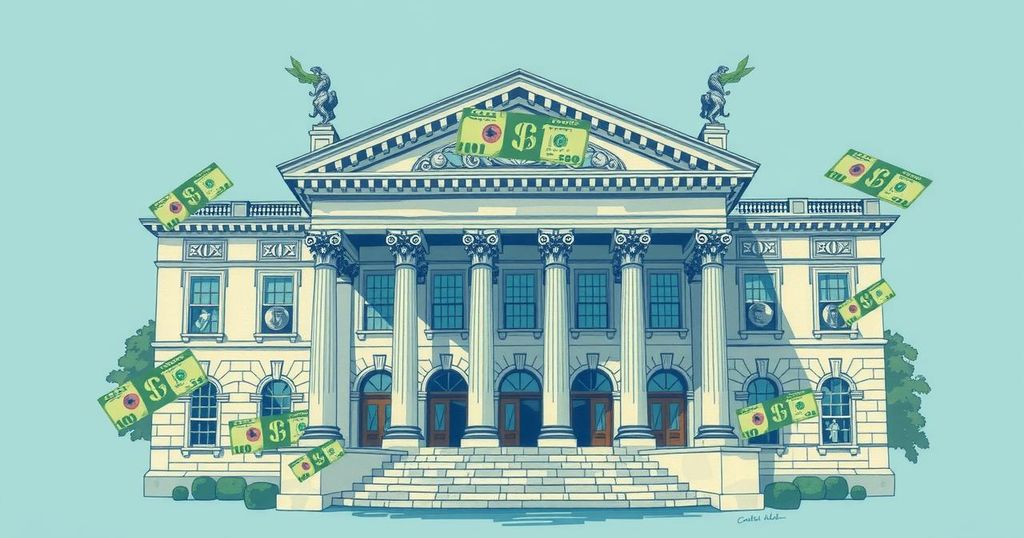U.S. Influence on Lebanon’s Central Bank Governorship Amidst Financial Crisis
The U.S. is actively participating in the selection process for Lebanon’s next central bank governor to combat corruption and limit Hezbollah’s influence. U.S. officials are reviewing candidates to endorse individuals committed to economic reform. The new governor will play a critical role in revitalizing Lebanon’s banking system amid an ongoing financial crisis.
The United States is actively engaging with the Lebanese government to influence the selection of the next central bank governor. This initiative is aimed at combating corruption and preventing illicit financing linked to the armed group Hezbollah. Sources indicate that Washington’s involvement is a notable example of its proactive stance on Lebanon’s critical monetary policy amidst the nation’s ongoing financial crisis, which has been deteriorating for over five years.
The U.S. continues to prioritize the weakening of Hezbollah’s influence in Lebanon, particularly following setbacks the group faced during last year’s conflict. Since the election of U.S.-backed Joseph Aoun as president, Hezbollah’s role in the government has diminished, paving the way for a cabinet that excludes the group. The urgent task for this new administration is to fill essential roles, including that of the central bank, which has lacked a permanent governor since July 2023.
U.S. officials are assessing several candidates for the governorship, highlighting Washington’s increasing involvement in Lebanon’s financial landscape. Meetings have taken place in both Washington and the U.S. embassy in Lebanon, focusing on candidates’ readiness to tackle terrorist financing and their willingness to confront Hezbollah. The State Department and White House have remained silent on inquiries regarding their involvement.
A Trump administration official reiterated that these discussions are part of “normal diplomacy,” yet emphasized that the U.S. is providing clear guidelines on suitable candidates: individuals with no connections to Hezbollah or corruption are essential for economic recovery. The U.S. seeks candidates who will vigorously pursue reforms and exhibit accountability in Lebanon’s banking operations.
Among those rumored to be considered for the central bank position are ex-minister Camille Abousleiman, Firas Abi-Nassif from an investment firm, and asset management heads Philippe Jabre and Karim Souaid. The forthcoming governor will be instrumental in spearheading the economic reforms promised by President Aoun and Prime Minister Nawaf Salam to navigate Lebanon from its severe financial crisis, which began in 2019 due to rampant corruption and ill management by the political elite.
Lebanon’s administration aims to reinitiate discussions with the International Monetary Fund (IMF) for a financing program, contingent on implementing the necessary reforms. Furthermore, both Western and Arab nations have stipulated such reforms as prerequisites for any reconstruction assistance, particularly following extensive damage inflicted by last year’s military campaign.
In discussions regarding the appointment of the central bank governor, U.S. officials have also been in communication with Saudi Arabia. The incoming governor will succeed interim chief Wassim Mansouri following the controversial exit of Riad Salameh, who faced sanctions from several countries for corruption. Salameh’s era ended following widespread financial turmoil in Lebanon, creating a pressing need for a credible and reform-focused successor who can restore international trust and oversight in the nation’s financial systems.
In summary, the U.S. is significantly involved in the selection of Lebanon’s next central bank governor to address ongoing issues of corruption and illicit financing. Essential candidates are being evaluated to ensure they align with necessary economic reforms required for Lebanon’s recovery. This proactive engagement showcases the U.S.’ continued commitment to mitigating Hezbollah’s influence while supporting Lebanon’s monetary stability after years of financial decline.
Original Source: www.usnews.com




Post Comment